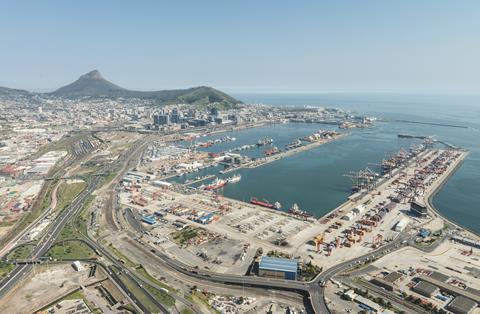Logistical problems are estimated to have cost the sector R1bn in 2024
South Africa’s apple and pear export industry is sounding the alarm over mounting losses caused by inefficiencies at the Port of Cape Town.

It estimates that delays and logistical bottlenecks have cost the sector around R1bn (US$57mn) in 2024 alone through additional storage, trucking, and plug-in costs, as well as missed market opportunities when vessels bypass Cape Town.
This week, the Western Cape Department of Mobility met with Two-a-Day, one of South Africa’s leading apple and pear packing and marketing cooperatives, and its logistics partner Link Supply Chain Management, for a strategic discussion and site visit aimed at tackling the logistical challenges affecting the fruit export industry.
Industry players warned that without urgent intervention – including the fast-tracking of the port’s privatisation – the country risks losing hard-won market share in key global markets.
“We work in a complex, time-sensitive value chain. If a vessel to Europe, the UK or the Far East is missed, the sale is gone. You don’t get a second chance to deliver on time in a programme-driven market,” said Roelf Pienaar, managing director of Tru-Cape Fruit Marketing.
“Logistics is the single biggest risk for us right now. If we can’t get our product out, everything else – from on-farm innovation to market development – is compromised.”
Chris Petzer, Two-a-Day’s operations director, explained that port delays often force the business to divert containers to Port Elizabeth at significant cost, simply to keep the supply chain moving and avoid halting harvest and packing operations. “It’s not sustainable, but sometimes it’s the only option to prevent greater losses,” he said.
While the port’s efficiency is improving slightly, Chris Knoetze, managing director of Link Supply Chain Management – a fourth-party logistics provider owned by several of the Western Cape’s leading fruit exporting companies – noted that exports are still being throttled.
“Higher productivity will attract more vessels and services, expand capacity, and give more reliable shipping options to various export markets,” he said.
“Given several interventions, like Transnet’s appointment and changes at senior management level, the repair and maintenance of equipment, solving personnel matters, focusing on operational improvement and capital investment in new rubber tyre gantry cranes (RTGs) in Cape Town Container Terminal, we should expect to see a step change in productivity to at least 20 gross crane movements per hour (GCH) or more in the coming months. However, the process is still too slow and far removed from the 33 GCH reported by Transnet in November 2012.”
Knoetze pointed out that when port operations are disrupted, it impacts product quality, increases costs, and damages South Africa’s credibility with overseas buyers, adding: “We urgently need to fast-track the privatisation of the Cape Town terminal to restore competitiveness”.



